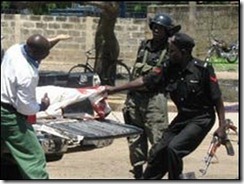 This year’s Eid celebrations in Nigeria were overshadowed by the spate of gun and bombs attacks across the country’s North East last Friday, that left at least one hundred and fifty people dead, many more wounded and several buildings reduced to rubble.
This year’s Eid celebrations in Nigeria were overshadowed by the spate of gun and bombs attacks across the country’s North East last Friday, that left at least one hundred and fifty people dead, many more wounded and several buildings reduced to rubble.
The atrocities were perpetrated by Boko Haram, a radical Islamist organisation deplored by the vast majority of Nigeria’s Muslims, focussed on undermining electoral democracy and anything else that its leaders perceive to stem from ‘Western influence’. Friday’s attacks were specifically targeted at the Christian community and police, but in the event resulted in the deaths of several Muslim civilians and the destruction of Mosques as well.

Notably these events come more than two years after the authorities claimed to have largely defeated Boko Haram, following a crackdown in the summer of 2009 that cumulated in the extra-judicial killing of leader Mohammed Yusaf in police custody. It is painfully clear today, that not only has the group survived, but it appears more organised, dangerous and ruthless than ever before.
This bodes ill for a country that has a painful history of inter-communal violence, illustrated not least by the tensions and violence that followed the re-election of President Goodluck Jonathan in April. The divide between the largely Muslim North and largely Christian South has long led to political upheaval, whilst breakouts of inter-communal conflict such as those in the city of Jos have often led to years of cyclical retaliatory attacks. It is imperative therefore, that the government does not allow Boko Haram to exploit existing issues and nurture its own fundamentalist and barbaric campaign into wider unrest.
Of course this is no small task, and already many Nigerians are suggesting that  their government is failing to sufficiently tackle the problem. Whilst the President has pledged to hunt down those responsible for the most recent attacks, some quarters of society have questioned whether continued attempts at achieving a military victory over the extremists should be side-lined in favour of addressing the socio-economic problems that provide them with a fertile recruiting ground in the first place.
their government is failing to sufficiently tackle the problem. Whilst the President has pledged to hunt down those responsible for the most recent attacks, some quarters of society have questioned whether continued attempts at achieving a military victory over the extremists should be side-lined in favour of addressing the socio-economic problems that provide them with a fertile recruiting ground in the first place.
Others, perhaps understandably given the extent of destruction so far, have called upon the authorities to go in precisely the other direction and employ stricter emergency powers in order to guarantee civilians’ protection.
This leaves a huge task for the President and his men; and one which will inevitably cost lives should they choose the wrong approach. Right now Nigeria is approaching crisis point, and the cause – Boko Haram, is showing no signal of diminishing. Ultimately the authorities are likely to require a fine balance of force, social change, external assistance and diplomacy if they are going to make genuine progress in what will inevitably be a long, hard fight.




No comments:
Post a Comment